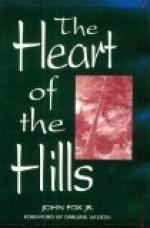The sun was just coming up over the great black bulks which had given the boy forth that morning to a new world. Back there its mighty rays were shattered against them, and routed by their shadows had fought helplessly on against the gloom of deep ravines—those fortresses of perpetual night—but, once they cleared the eminence where Jason sat, the golden arrows took level flight, it seemed, for the very end of the world. This was the land of the Blue-grass—the home of the rock-pecker, home of the men who had robbed him of his land, the refuge to his Cousin Steve, his mother, and little Mavis, and now their home. He could see no end of the land, for on and on it rolled, and on and on as far as it rolled were the low woodlands, the fields of cut corn— more corn than he knew the whole world held—and pastures and sheep and cattle and horses, and houses and white fences and big white barns. Little Jason gazed but he could not get his fill. Perhaps the old nag, too, knew those distant fields for corn, for with a whisk of her stubby tail she started of her own accord before the lad could dig his bare heels into her bony sides, and went slowly down. The log cabins had disappeared one by one, and most of the houses he now saw were framed. One, however, a relic of pioneer times, was of stone, and at that the boy looked curiously. Several were of red brick and one had a massive portico with great towering columns, and at that he looked more curiously still. Darkies were at work in the fields. He had seen only two or three in his life, he did not know there were so many in the world as he saw that morning, and now his skin ruffled with some antagonism ages deep. Everybody he met in the road or passed working in the fields gave him a nod and looked curiously at his big pistol, but nobody asked him his name or where he was going or what his business was; at that he wondered, for everybody in the mountains asked those questions of the stranger, and he had all the lies he meant to tell, ready for any emergency to cover his tracks from any possible pursuers. By and by he came to a road that stunned him. It was level and smooth and made, as he saw, of rocks pounded fine, and the old nag lifted her feet and put them down gingerly. And this road never stopped, and there was no more dirt road at all. By and by he noticed running parallel with the turnpike two shining lines of iron, and his curiosity so got the better of him that he finally got off his old nag and climbed the fence to get a better look at them. They were about four feet apart, fastened to thick pieces of timber, and they, too, like everything else, ran on and on, and he mounted and rode along them much puzzled. Presently far ahead of him there was a sudden, unearthly shriek, the rumbling sound of a coming storm, rolling black smoke beyond the crest of a little hill, and a swift huge mass swept into sight and, with another fearful blast, bore straight at him. The old nag snorted with terror, and in




